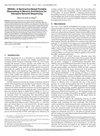Efficient Implementation of Knuth Yao Sampler on Reconfigurable Hardware
IF 1.4
3区 计算机科学
Q4 COMPUTER SCIENCE, HARDWARE & ARCHITECTURE
引用次数: 0
Abstract
Lattice-based cryptography offers a promising alternative to traditional cryptographic schemes due to its resistance against quantum attacks. Discrete Gaussian sampling plays a crucial role in lattice-based cryptographic algorithms such as Ring Learning with error (R-LWE) for generating the coefficient of the polynomials. The Knuth Yao Sampler is a widely used discrete Gaussian sampling technique in Lattice-based cryptography. On the other hand, Lattice based cryptography involves resource intensive complex computation. Due to the presence of inherent parallelism, on field programmability Field Programmable Gate Array (FPGA) based reconfigurable hardware can be a good platform for the implementation of Lattice-based cryptographic algorithms. In this work, an efficient implementation of Knuth Yao Sampler on reconfigurable hardware is proposed that not only reduces the resource utilization but also enhances the speed of the sampling operation. The proposed method reduces look up table (LUT) requirement by almost 29% and enhances the speed by almost 17 times compared to the method proposed by the authors in (Sinha Roy et al., 2014).在可重构硬件上高效实现 Knuth Yao 采样器
由于能抵御量子攻击,基于晶格的加密技术为传统加密方案提供了一种前景广阔的替代方案。离散高斯采样在基于网格的加密算法中起着至关重要的作用,如用于生成多项式系数的有误差环学习(R-LWE)。Knuth Yao 采样器是基于网格的密码学中广泛使用的离散高斯采样技术。另一方面,基于网格的密码学涉及资源密集型的复杂计算。由于存在固有的并行性,基于现场可编程门阵列(FPGA)的可重构硬件可以成为实现基于网格的加密算法的良好平台。本研究提出了一种在可重构硬件上高效实现 Knuth Yao 采样器的方法,不仅降低了资源利用率,还提高了采样操作的速度。与作者在(Sinha Roy 等人,2014 年)中提出的方法相比,所提出的方法减少了近 29% 的查找表(LUT)需求,速度提高了近 17 倍。
本文章由计算机程序翻译,如有差异,请以英文原文为准。
求助全文
约1分钟内获得全文
求助全文
来源期刊

IEEE Computer Architecture Letters
COMPUTER SCIENCE, HARDWARE & ARCHITECTURE-
CiteScore
4.60
自引率
4.30%
发文量
29
期刊介绍:
IEEE Computer Architecture Letters is a rigorously peer-reviewed forum for publishing early, high-impact results in the areas of uni- and multiprocessor computer systems, computer architecture, microarchitecture, workload characterization, performance evaluation and simulation techniques, and power-aware computing. Submissions are welcomed on any topic in computer architecture, especially but not limited to: microprocessor and multiprocessor systems, microarchitecture and ILP processors, workload characterization, performance evaluation and simulation techniques, compiler-hardware and operating system-hardware interactions, interconnect architectures, memory and cache systems, power and thermal issues at the architecture level, I/O architectures and techniques, independent validation of previously published results, analysis of unsuccessful techniques, domain-specific processor architectures (e.g., embedded, graphics, network, etc.), real-time and high-availability architectures, reconfigurable systems.
 求助内容:
求助内容: 应助结果提醒方式:
应助结果提醒方式:


